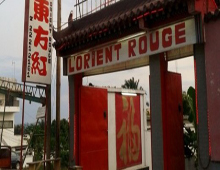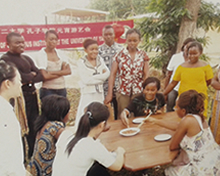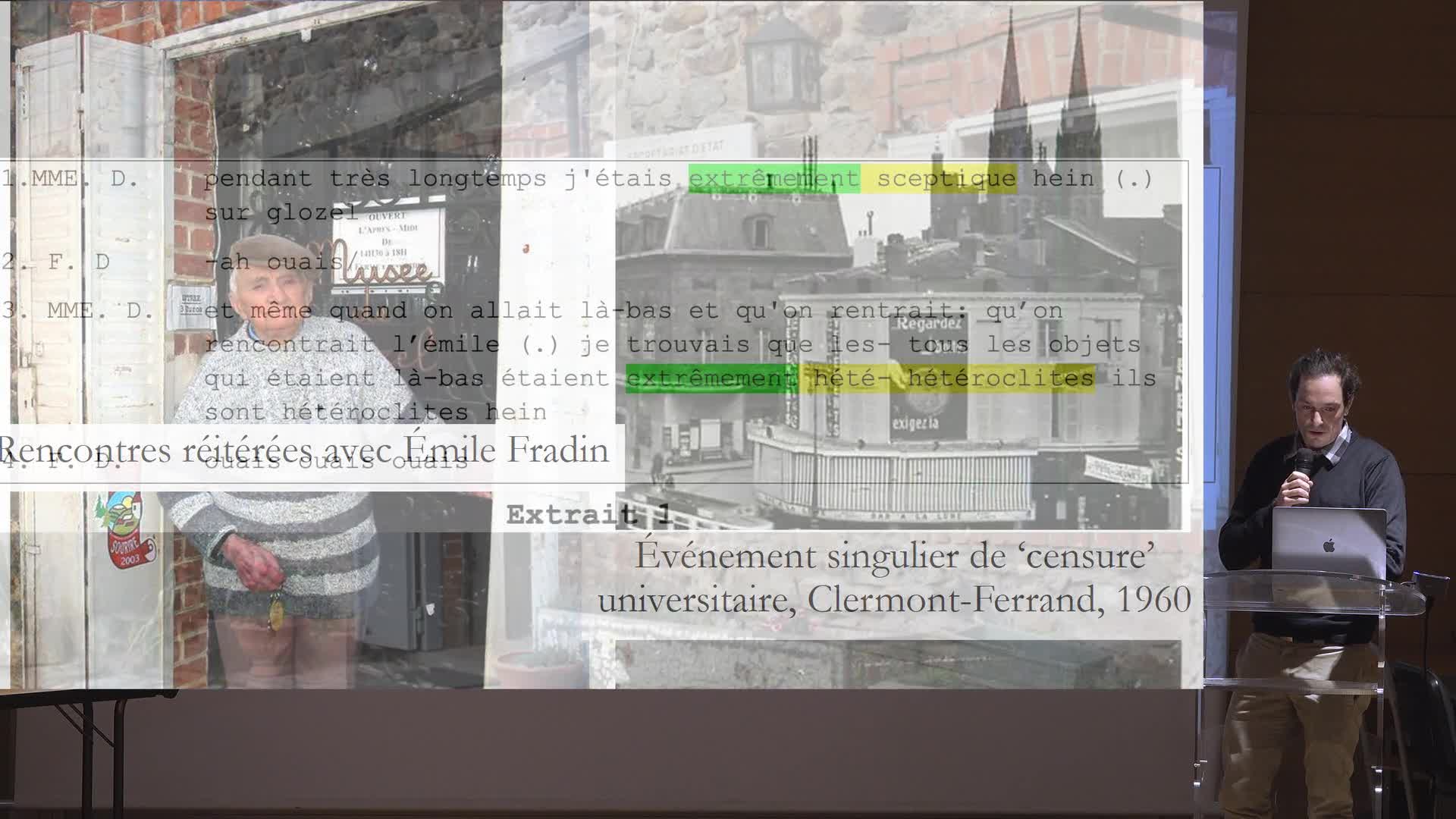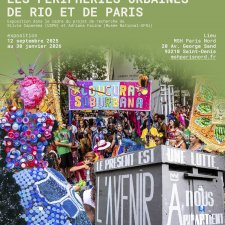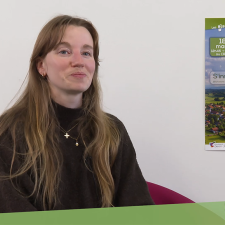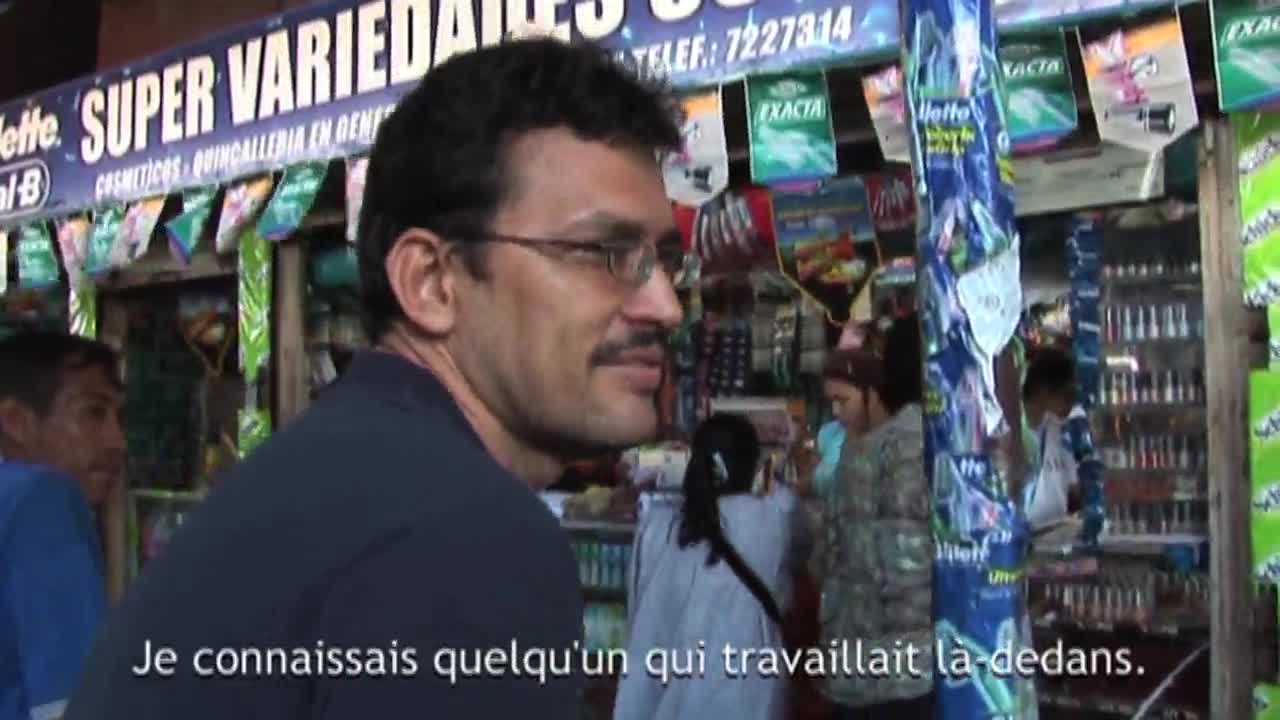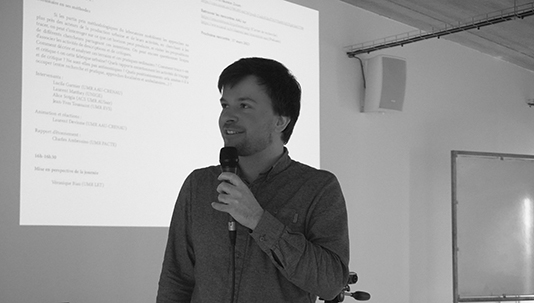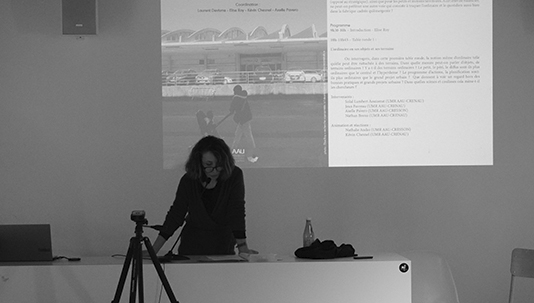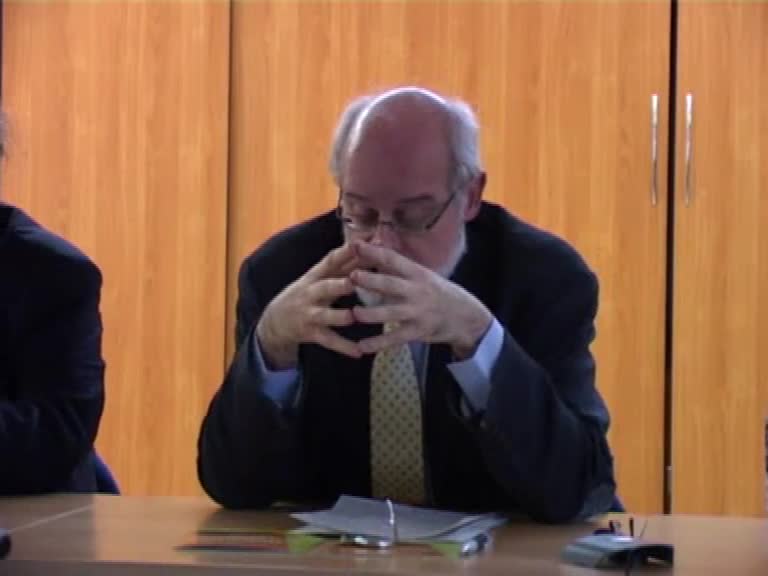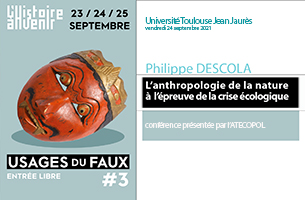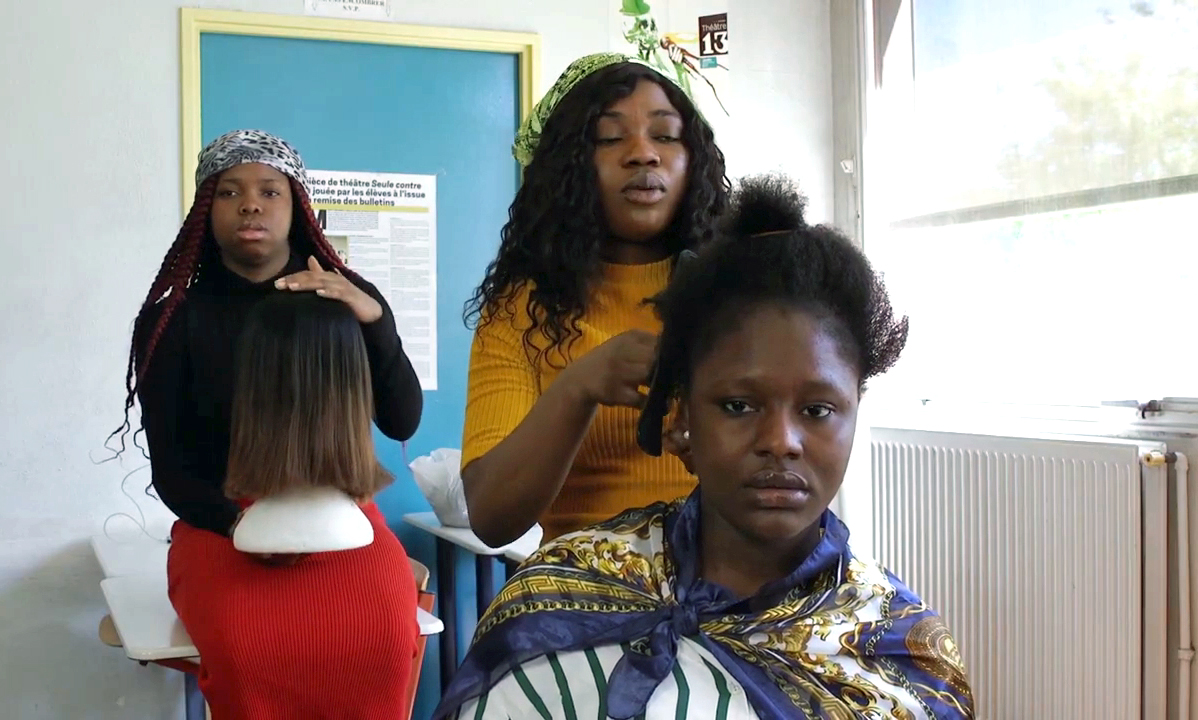Chapitres
- Introduction par Françoise BOURDARIAS02'13"
- Intervention de Frédéric OBRINGER : "The Construction and Position of Chinese Medicine (zhongyi ??) in China and Other Regions of the World at the Start of the 21st Century"21'10"
- Intervention de Françoise BOURDARIAS : "Chinese Medicine in Mali. Knowledge, Art and Technique"22'21"
- Intervention de Evelyne MICOLLIER : "(Chinese) Medicine Practising in Contemporary China: knowledge, practices and issues regarding its dissemination"20'19"
- Intervention de Laurent PORDIE (discutant)19'38"
- Discussion31'55"
Notice
Définition et enjeux de la "vraie médecine chinoise" en contextes chinois et africains
- document 1 document 2 document 3
- niveau 1 niveau 2 niveau 3
Descriptif
The dissemination of Chinese medicine in the global context is contributing increasingly to the reconfiguration of local therapeutic fields. It tends to modify relations between the different forms of medicine and categories of practitioners, with the emergence of new modalities of collaboration and opposition, new syncretisms, and some times technical innovations.
In this panel, we will focus on the Chinese medical practices developing in African countries. Today, they occupy an ever-increasing place in therapeutic fields characterized by crumbling public health systems, policies for the patrimonialization of traditional practices, and finally by an uncontrolled development of the drug market. Alongside doctors trained in Chinese universities, healers and Chinese and African pharmacopoeia sellers claim to practice “traditional Chinese medicine.” These practitioners argue their legitimacy by referring to competing definitions of “real” Chinese medicine. In this specific context, the debate on the ties between theoretical and practical medical knowledge, between knowledge and techniques, and finally on the art of practitioners is developing. These phenomena cannot be understood without taking the transformations of Chinese medicine in China itself into account, where some challenge the institutional “Traditional Chinese Medicine” system, or, in other words, the standardized and bio-medicalized form of Chinese medicine promoted by the Chinese government since 1950.
The papers proposed by this panel’s China and Africa specialists should enable us to put into perspective the evolutions in therapeutic practices that can be observed in China and certain African countries, and to apprehend their economic, political and symbolic stakes in the specific context of each social configuration.
We thus hope to generate a debate on the forms of interdependency that connect local therapeutic fields today.
Intervention / Responsable scientifique
Dans la même collection
-
Arts contemporains : imaginaires de la Chine en Afrique et de l'Afrique en Chine
Loumpet-GalitzineAlexandraDíaz CastilloRobertoSimbaoRuth KerkhamAdogonyBaudoin EulogeDaoMyriamLinks between China and Africa today tend to be thought of, primarily, in economic and/or political terms. The arts, or culture more broadly, are given relatively little attention, for they are
-
Géopolitique du patrimoine ; Perspectives croisées Chine-Afrique
BodolecCarolineLoumpet-GalitzineAlexandraCousinSaskiaTrémonAnne-ChristineSaatenangDominiqueIncreasing State and local community interest in Intangible Cultural Heritage (ICH) highlights, as with other UNESCO programmes, the stakes that now crystallize different acceptations of the notion of
-
Appropriation des produits médicaux venant de Chine au Cameroun
KernenAntoineCandeliseLuciaNgo LikengJulienne LouiseAfter a period of dissemination of so-called “traditional” Chinese medicine in Africa thanks to Chinese practitioners working in the public sector (hospitals), or setting up private practices in towns
-
Ouverture scientifique du colloque EsCA
Loumpet-GalitzineAlexandraArrifTeddyBourdariasFrançoiseDittgenRomainDozonJean-PierreEspaces de la culture chinoise en Afrique : diffusion, agencements, interactions Etudes du Soft power chinois en Afrique et des espaces socio-culturels ouverts par des communautés chinoises et
-
Chinese Spaces and Cultural Makers in African Cities
ChunguGeraldDittgenRomainGuo ChatelardSolangeZackTanyaEspaces de la culture chinoise en Afrique : diffusion, agencements, interactions Etudes du Soft power chinois en Afrique et des espaces socio-culturels ouverts par des communautés chinoises et
-
Chinese spaces of diffusion and interaction in Africa
BatchelorKathrynDozonJean-PierreProcopioMaddalenaShumanAmandaVergèsFrançoiseGilbertCatherinePolitiques au moment des indépendances africaines, les canaux de diffusion et d'interaction entre les pays africains et la Chine sont surtout appréhendés depuis quelques années en termes économiques
-
Ouvrage : La Chine en Afrique du Sud / China in South Africa
DittgenRomainHoUlfriedaParkYoon JungUlfrieda HO (Journalist) Author of “Papers sons and Daughters; Growing up Chinese in South Africa” (Paperback Ed. 2012) / Yoon JUNG PARK (Convenor, China in Africa-Africa in China Network)
-
Chinese – African Figures of inbetweeness
GieseKarstenLamKatyMarfaingLaurenceSaatenangDominiqueThe Chinese-African encounter – a source of creativity, adaptation, but also of disorder – is transforming African societies. Whether talking about the Chinese present in Africa, or Africans
-
Produits chinois en Afrique : réseaux de diffusion et modes de consommation
KernenAntoineHahnHans PeterKhan MohammadGuiveParkYoon JungThis panel intends to offer a new perspective on the massive arrival of Chinese products effecting Africa for the past fifteen years. Available in markets in even the most remote villages of the
Avec les mêmes intervenants et intervenantes
-
Ouverture scientifique du colloque EsCA
Loumpet-GalitzineAlexandraArrifTeddyBourdariasFrançoiseDittgenRomainDozonJean-PierreEspaces de la culture chinoise en Afrique : diffusion, agencements, interactions Etudes du Soft power chinois en Afrique et des espaces socio-culturels ouverts par des communautés chinoises et
-
Matinée - Partie 1 - Catégoriser les acteurs des espaces d'interaction sino-africains
Loumpet-GalitzineAlexandraKernenAntoineBourdariasFrançoiseGieseKarstenIntermédiaires, médiateurs, traducteurs ? Catégoriser les acteurs des espaces d’interaction sino-africains
Sur le même thème
-
Glozel dans les années 2020 : pour une approche ethnographique et politique du discours dans la (re…
DanosFélixL’affaire Glozel dispose encore de ses pro- et de ses anti-. Félix Danos questionne le maintien d’un malentendu entre deux parties qui pourtant souhaitent la même chose : la valorisation d’un ensemble
-
Journée d’étude I Les lucioles : art, culture et espoir dans les périphéries urbaines de Rio et de …
Capanema P. De AlmeidaSílviaFacinaAdrianaBirmanPatríciaMerklenDenisCarneiroSandra de SáDans nos paysages urbains généralisés, nous cherchons les lucioles. En leur absence, les collectifs culturels sont capables de rallumer les étoiles, comme dans les vers d’Apollinaire. Autrement dit,
-
S'installer à la campagne
LatouilleOphélieOphélie Latouille présente son travail de recherche doctorale consacré aux mobilités résidentielles vers les zones rurales et aux transitions professionnelles vers le non-salariat, dans des contextes
-
Prendre la mesure de nos milieux de vie
GramagliaChristelleChristelle Gramaglia, chercheuse à l'INRAE de Montepellier, présente un autre de ses terrains d'étude : Fos-sur-mer.
-
Prendre la mesure de nos milieu de vie
L’HerGwendolineGwendoline L'Her introduit la thématique de l'après-midi : prendre la mesure de nos milieux de vie.
-
Las Playitas ( VO en espagnol sous-titrée en français)
RaoulxBenoîtA Maracaibo, le marché populaire de Las Playitas constitue une scène représentative d’une ville vénézuélienne. Dans ce lieu de la consommation s’entrechoquent le rêve collectif d’ascension sociale et
-
Table ronde 1 : L’ordinaire en ses objets et ses terrains - Introduction
AudasNathalieChesnelKevinKévin Chesnel et Nathalie Audas introduisent la table ronde 1 en présentant les thématiques et questionnements.
-
Accueil et présentation
ThomasRachelRoyÉliseElise Roy introduit la journée 5 du cycle des Rencontres AAU " L’ordinaire de la fabrique urbaine", fabrique institutionnelle ou fabrique émergente portée par les acteurs dit "ordinaires" et en ouvre
-
La circulation des textes grecs ou les chemins du savoir
HoffmannPhilippePour un printemps des savoirs en Méditerranée C ycle de conférences organisé par la Maison méditerranéenne des sciences de l'homme, 31 mars 2009, Aix-en-Provence Rencontre avec : La Méditerranée ou
-
L’anthropologie de la nature à l’épreuve de la crise écologique. Rencontre avec Philippe Descola
DescolaPhilippeLa crise de la biodiversité et le changement climatique, parce qu’ils posent clairement la question de l’habitabilité de cette planète dans un futur proche, invitent à réfléchir aux mécanismes qui
-
le resilience assessment framework, un outil de diagnostic pour les villes et les secteurs s…
Par Maria Adriana Cardoso, chercheuse au Laboratoire du Génie Civil du Portugal, accompagnée de Maria João Telhado, Cheffe de division Environnement et énergie, Municipalité de Lisbonne dans le cadre
-
Les filles d’Eugénie
Trois rencontres avec un génie



